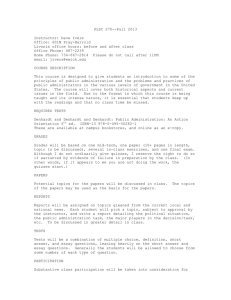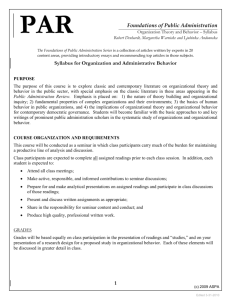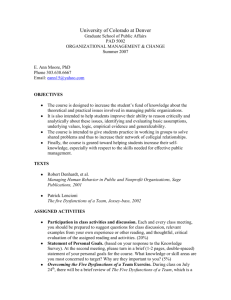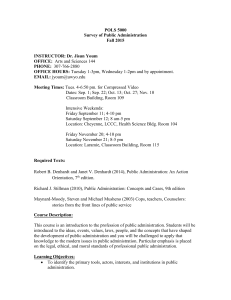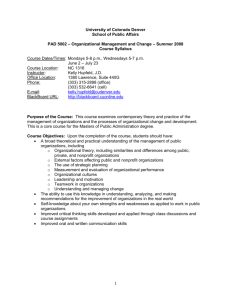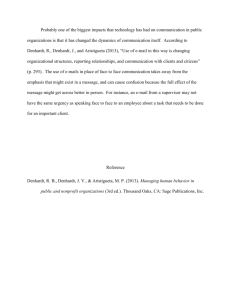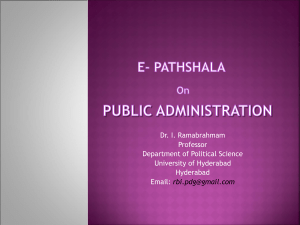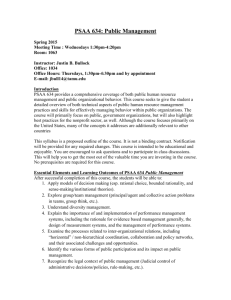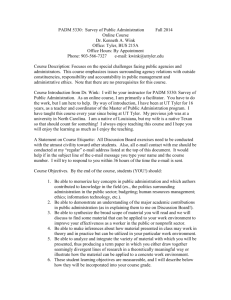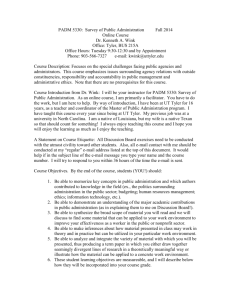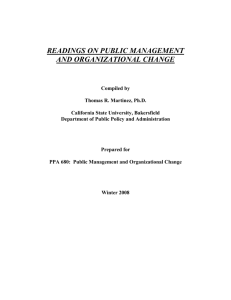Foundations of Public Administration 1 PAR Articles on or
advertisement
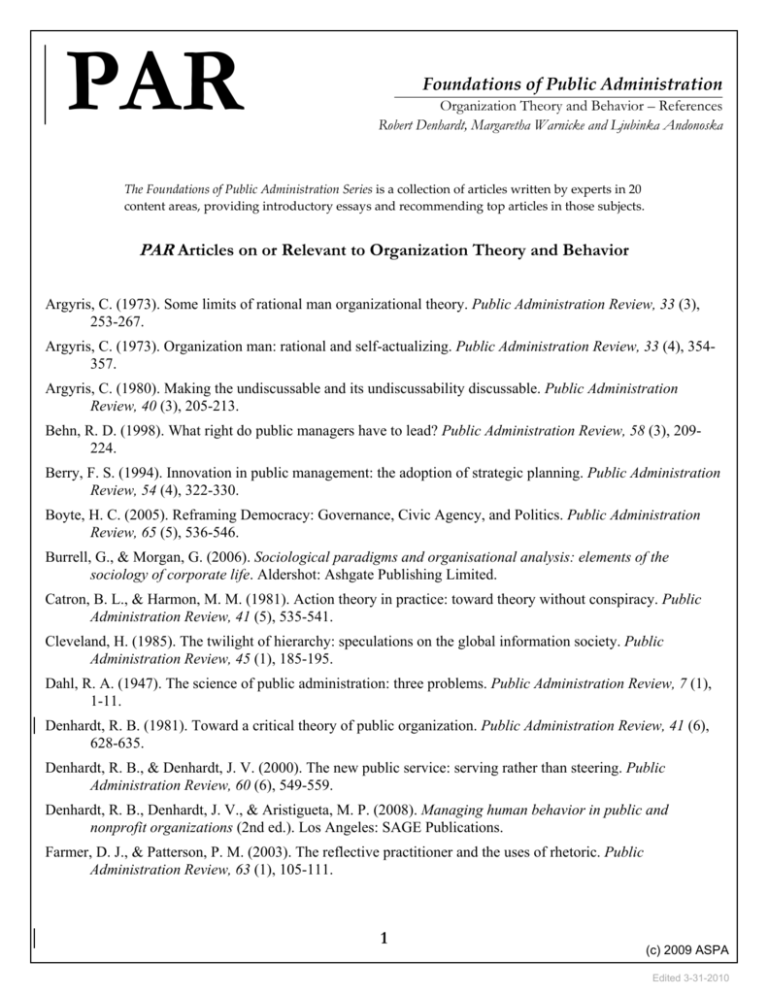
PAR Foundations of Public Administration Organization Theory and Behavior – References Robert Denhardt, Margaretha Warnicke and Ljubinka Andonoska The Foundations of Public Administration Series is a collection of articles written by experts in 20 content areas, providing introductory essays and recommending top articles in those subjects. PAR Articles on or Relevant to Organization Theory and Behavior Argyris, C. (1973). Some limits of rational man organizational theory. Public Administration Review, 33 (3), 253-267. Argyris, C. (1973). Organization man: rational and self-actualizing. Public Administration Review, 33 (4), 354357. Argyris, C. (1980). Making the undiscussable and its undiscussability discussable. Public Administration Review, 40 (3), 205-213. Behn, R. D. (1998). What right do public managers have to lead? Public Administration Review, 58 (3), 209224. Berry, F. S. (1994). Innovation in public management: the adoption of strategic planning. Public Administration Review, 54 (4), 322-330. Boyte, H. C. (2005). Reframing Democracy: Governance, Civic Agency, and Politics. Public Administration Review, 65 (5), 536-546. Burrell, G., & Morgan, G. (2006). Sociological paradigms and organisational analysis: elements of the sociology of corporate life. Aldershot: Ashgate Publishing Limited. Catron, B. L., & Harmon, M. M. (1981). Action theory in practice: toward theory without conspiracy. Public Administration Review, 41 (5), 535-541. Cleveland, H. (1985). The twilight of hierarchy: speculations on the global information society. Public Administration Review, 45 (1), 185-195. Dahl, R. A. (1947). The science of public administration: three problems. Public Administration Review, 7 (1), 1-11. Denhardt, R. B. (1981). Toward a critical theory of public organization. Public Administration Review, 41 (6), 628-635. Denhardt, R. B., & Denhardt, J. V. (2000). The new public service: serving rather than steering. Public Administration Review, 60 (6), 549-559. Denhardt, R. B., Denhardt, J. V., & Aristigueta, M. P. (2008). Managing human behavior in public and nonprofit organizations (2nd ed.). Los Angeles: SAGE Publications. Farmer, D. J., & Patterson, P. M. (2003). The reflective practitioner and the uses of rhetoric. Public Administration Review, 63 (1), 105-111. 1 (c) 2009 ASPA Edited 3-31-2010 PAR Foundations of Public Administration Organization Theory and Behavior – References Robert Denhardt, Margaretha Warnicke and Ljubinka Andonoska Gawthrop, L. C. (1997). Democracy, bureaucracy, and hypocrisy redux: a search for sympathy and compassion. Public Administration Review, 57 (3), 205-210. Golembiewski, R. T. (1960). O & m and the small group. Public Administration Review, 20 (4), 205-212. Golembiewski, R. T. (1962). Organization as a moral problem. Public Administration Review, 22 (2), 51-58. Golembiewski, R. T. (1969). Organization development in public agencies: perspectives on theory and practice. Public Administration Review, 29 (4), 367-377. Goodsell, C. T. (1992). The public administrator as artisan. Public Administration Review, 52 (3), 246-253. Kaboolian, L. (1998). The new public management: challenging the boundaries of the management vs. administration debate. Public Administration Review, 58 (3), 189-193. Kaufman, H. (1969). Administrative decentralization and political power. Public Administration Review, 29 (1), 3-15. Kaufman, H. (1973). The direction of organizational evolution. Public Administration Review, 33 (4), 300-307. Kaufman, H. (1981). Fear of bureaucracy: a raging pandemic. Public Administration Review, 41 (1), 1-9. Kettl, D. F. (2000). The transformation of governance: globalization, devolution, and the role of government. Public Administration Review, 60 (6), 488-497. Kettl, D. F. (2006). Managing boundaries in american administration: the collaboration imperative. Public Administration Review, 66 (s1), 10-19. Kirkhart, L., & Orion F. White, Jr. (1974). The future of organization development. Public Administration Review, 34 (2), 129-140. Kirlin, J. J. (2001). Big questions for a significant public administration. Public Administration Review, 61 (2), 140-143. Korten, D. C. (1984). Strategic organization for people-centered development. Public Administration Review, 44 (4), 341-352. Landau, M. (1969). Redundancy, rationality, and the problem of duplication and overlap. Public Administration Review, 29 (4), 346-358. Levine, C. H. (1978). Organizational decline and cutback management. Public Administration Review, 38 (4), 316-325. Levitan, D. M. (1943). Political ends and administrative means. Public Administration Review, 3 (4), 353-359. Meier, K. J., & O'Toole Jr., L. J. (2003). Public management and educational performance: the impact of managerial networking. Public Administration Review, 63 (6), 689-699. Montgomery Van, W. (2003). Public-sector leadership theory: an assessment. Public Administration Review, 63 (2), 214-228. 2 (c) 2009 ASPA PAR Foundations of Public Administration Organization Theory and Behavior – References Robert Denhardt, Margaretha Warnicke and Ljubinka Andonoska Montjoy, R. S., & O'Toole, L. J., Jr. (1979). Toward a theory of policy implementation: an organizational perspective. Public Administration Review, 39 (5), 465-476. Norton, E. L. (1949). Power and administration. Public Administration Review, 9 (4), 257-264. Perry, J. L., & Wise, L. R. (1990). The Motivational Bases of Public Service. Public Administration Review, 50 (3), 367-373. Presthus, R. V. (1960). Authority in organizations. Public Administration Review, 20 (2), 86-91. Provan, K. G., & Milward, H. B. (2001). Do networks really work? a framework for evaluating public-sector organizational networks. Public Administration Review, 61 (4), 414-423. Ramos, A. G. (1972). Models of man and administrative theory. Public Administration Review, 32 (3), 241-246. Rosenbloom, D. H. (1983). Public administrative theory and the separation of powers. Public Administration Review, 43 (3), 219-227. Schott, R. L. (1986). The psychological development of adults: implications for public administration. Public Administration Review, 46 (6), 657-667. Scott, W. G. (1969). Organization government: the prospects for a truly participative system. Public Administration Review, 29 (1), 43-53. Sergio Fernandez, H. G. R. (2006). Managing successful organizational change in the public sector. Public Administration Review, 66 (2), 168-176. Sherwood, F. P., & Page, W. J., Jr. (1976). MBO and public management. Public Administration Review, 36 (1), 5-12. Simon, H. A. (1946). The proverbs of administration. Public Administration Review, 6 (1), 53-67. Simon, H. A. (1947). A comment on "the science of public administration". Public Administration Review, 7 (3), 200-203. Simon, H. A. (1965). Administrative decision making. Public Administration Review, 25 (1), 31-37. Simon, H. A. (1973). Organization man: rational or self-actualizing? Public Administration Review, 33 (4), 346353. Swiss, J. E. (1992). Adapting total quality management (tqm) to government. Public Administration Review, 52 (4), 356-362. Waldo, D. (1968). Public administration in a time of revolutions. Public Administration Review, 28 (4), 362368. White, O. F. (1969). The dialectical organization: an alternative to bureaucracy. Public Administration Review, 29 (1), 32-42. Wichowsky, A., & Moynihan, D. P. (2008). Measuring how administration shapes citizenship: a policy feedback perspective on performance management. Public Administration Review, 68 (5), 908-920. 3 (c) 2009 ASPA PAR Foundations of Public Administration Organization Theory and Behavior – References Robert Denhardt, Margaretha Warnicke and Ljubinka Andonoska About the Authors Robert B. Denhardt Is an ASU Regents Professor, Lincoln Professor of Leadership and Ethics and Director of the School of Public Affairs at Arizona State University. He is also a Distinguished Visiting Scholar at the University of Delaware. rbd@asu.edu Margaretha Warnicke is a doctoral student in the School of Public Affairs at Arizona State University. She has a master’s degree in history from the University of Delaware. margaretha.warnicke@asu.edu Ljubinka Andonoska is a doctoral student in the School of Public Affairs at Arizona State University. She has a master’s degree in public administration from Arizona State University. ljubinka.andonoska@asu.edu 4 (c) 2009 ASPA
